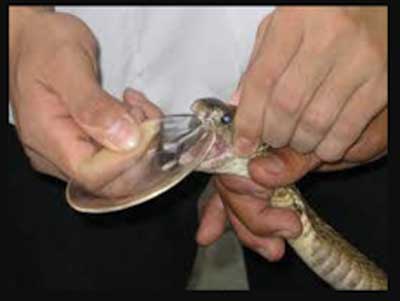- Home
- Editorial
- News
- Practice Guidelines
- Anesthesiology Guidelines
- Cancer Guidelines
- Cardiac Sciences Guidelines
- Critical Care Guidelines
- Dentistry Guidelines
- Dermatology Guidelines
- Diabetes and Endo Guidelines
- Diagnostics Guidelines
- ENT Guidelines
- Featured Practice Guidelines
- Gastroenterology Guidelines
- Geriatrics Guidelines
- Medicine Guidelines
- Nephrology Guidelines
- Neurosciences Guidelines
- Obs and Gynae Guidelines
- Ophthalmology Guidelines
- Orthopaedics Guidelines
- Paediatrics Guidelines
- Psychiatry Guidelines
- Pulmonology Guidelines
- Radiology Guidelines
- Surgery Guidelines
- Urology Guidelines
Snake venom may replace aspirin for heart disease patients

Beijing: Scientists have found that a snake venom can provide a safer alternative to drugs like aspirin that help prevent blood clots in heart disease patients.
Anti-platelet drugs prevent blood cells called platelets from clumping together and are widely used to treat heart disease.
Excessive bleeding after injury is a serious effect of current anti-platelet drugs, such as aspirin.
Previous research has found that trowaglerix, a protein in the venom of the Tropidolaemus waglerix snake, stimulated platelets to form blood clots by latching onto GPVI.
Platelets missing GPVI do not form blood clots inpatients and do not lead to severe bleeding.
Researchers from the National Taiwan University in Chinathus thought that blocking GPVI could prevent blood clotting while avoiding the side effects of prolonged bleeding.
They designed a drug to interact with the protein glyco-protein VI (GPVI) that sits on the surface of platelets.
The team designed a molecule based on the structure of trowaglerix to block GPVI activity. It prevented platelets from clotting when it was mixed with blood.
They found that the mice administered with this new drug had slower blood clot formation compared to untreated mice. In addition, the treated mice did not bleed longer than untreated mice.
"Some of the currently available anti-platelet drugs target another protein. Those drugs were based on a protein found in snake venom - but why that target leads to the bleeding side effect is not fully understood," said Tur-FuHuang from National Taiwan University.
Excessive bleeding after injury is a serious effect of current anti-platelet drugs, so the results support that thismolecule design can be a template for a new, safer class of anti-platelet drugs with limited bleeding side effect,researchers said.
"In general, this type of molecule design does not last long in the body, so techniques like formulation or delivery system are likely needed to extend the exposure time in the human body," said co-author Jane Tseng, professor at Graduate National Taiwan University.
"The design must also be optimised to ensure that themolecule only interacts with GPVI and not other proteins whichcan cause unintended reactions," Tseng added.
The study was published in the journal Arteriosclerosis,Thrombosis and Vascular Biology. APA MHNMHN

Disclaimer: This site is primarily intended for healthcare professionals. Any content/information on this website does not replace the advice of medical and/or health professionals and should not be construed as medical/diagnostic advice/endorsement or prescription. Use of this site is subject to our terms of use, privacy policy, advertisement policy. © 2020 Minerva Medical Treatment Pvt Ltd